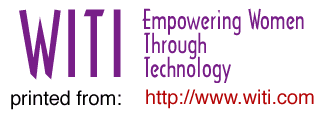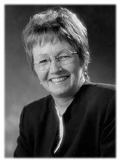
 Tama Olver
Tama Olver
Vice President, Information Services and CIO
Quantum Corporation
Tama Olver joined Quantum as vice president and chief information officer in January 2000. She is responsible for Quantumıs global information services, applications, and operations. She is dedicated to ensuring that Quantum uses information technology effectively to maintain and grow its industry leadership.
She previously served as vice president and chief information officer of Informix Software and Amdahl Corporation.
Prior to her roles in Information Technology, Olver held positions at Amdahl Corporation, Remote Computing Corporation, and Control Data Corporation in product development. She led development of the earliest timesharing a computer graphics applications in the industry as well as pioneering data management solutions for investment and trading.
Olver has been named to the McGraw Hill Companiesı list of the nationıs "Top 100 Women in Computing for 1996" and named "Woman of Achievement in Science and Technology" by the Womenıs Fund of San Jose. She often participates as a guest speaker and panelist at conferences and trade shows. She is on the advisory board of Women In Technology International Foundation, the board of the Society for Information Management Silicon Valley, and the board of the Child Abuse Prevention Center of San Mateo and Santa Clara Counties.
Tama holds a B.Sc. degree in mathematics from Michigan State University.
1. What was your first job in technology?
4. Who has been the most influential person in your life? Why?
On a lighter note:
I love to recommend two thought-provoking books I find few people in business have read: Leadership and the New Sciences by Margaret Wheatley and The Futures of Women: Scenarios for the 21st Century by Pamela McCorduck and Nancy Ramsey.
I was a programmer/analyst working for Control Data Corporation immediately following graduation from college. We developed some of the earliest wide band graphics and timesharing software. Our customers used the systems to solve problems in fields such as seismology and ship-building which were previously unsolved.
2. Who has been your most significant mentor? Why?
I can't identify a single, most significant, mentor. I have been fortunate to be surrounded by people with special skills who have been willing to help me -- especially to help me see into my blind spots. Perhaps a manager about a decade ago who is still the best listener I have ever known contributed most by helping me become a far better listener.
3. What has been your greatest challenge and what strategies did you use to overcome
obstacles?
My greatest challenges have been managing change, especially in recent years when the need to change much more quickly has become so critical. It is especially challenging to work with a successful organization and achieve enough change, fast enough. To overcome the obstacles I use my experience. I also study what is going on in change management, seek advice from others facing the same challenges, and listen to industry leaders facing the same challenges. I saw Carly Fiorina of Hewlett-Packard speak at a conference last week and got a lot out of her comments about change at HP which I can apply.
A role model I met when I was 16 opened up the possibility of working in computers and had a great influence on my opportunities. My husband has had the most influence on my happiness and current success.
5. What lessons have you learned that would be valuable to women beginning their
careers in technology?
Go for it! Technology is a great field where you can enjoy success and make a difference in the world. With the talent shortage in the industry and the impact of the Internet, there is virtually no limit to the possibilities. Commit to be a life-long learner.
6. What new technology do you believe will have the most positive impact on the
world in the next 20 years? The most negative impact?
The adoption of the Internet to connect everyone, and potentially billions of devices, with each other globally, will change economic and social systems in dramatic ways. Most of what we have seen to date is only a beginning. The positive impacts will be from dramatic improvement in global access to information, products, and services. I can imagine a world which is more secure, healthier, and significantly more efficient with direct access of consumers to suppliers for virtually everything in life. The negative impacts will be from upheaval to existing systems and, potentially, from the creation of a scary divide between those who have access and those who don't.
1. If you could have dinner with any 2 people (living or not), who would they be?
William Shakespeare and Mahatma Gandi. Possibly not at the same dinner!
2. What was the last book you read? What books do you love to recommend?
I recently finished Leonardo's Mountain of Clams and the Diet of Worms by Stephen Jay Gould, Testament by John Grisham, and Raving Fans by Ken Blanchard and Sheldon Bowles.
3. If you couldn't do what you are doing now, what profession would you choose?
This is a hard question -- the profession I have works so well for me. While I have none of the talents or background, I think it might be fun to be a cartoonist -- to combine art and humor with insight into life and share the result with a lot of people.
4. What is your definition of success?
Success is living in the present and realizing my potential to make a difference in the world.
|
For more 'WITI Women' articles, go to: http://www.witi.com/wire/witiwomen/ For all the latest news and information on women in technology, visit http://www.witi.com |